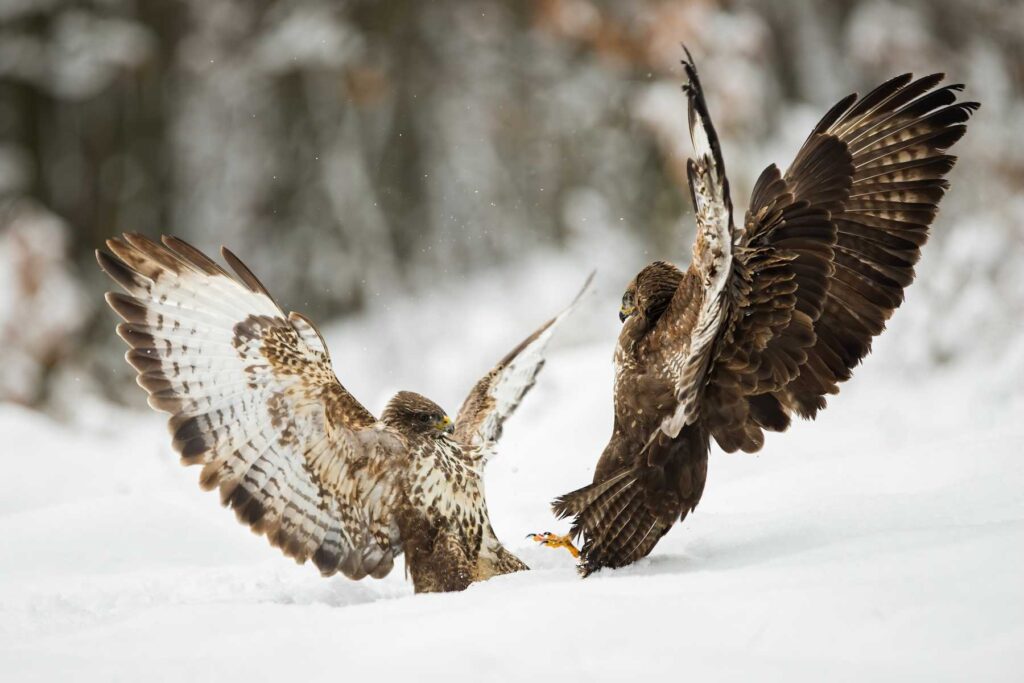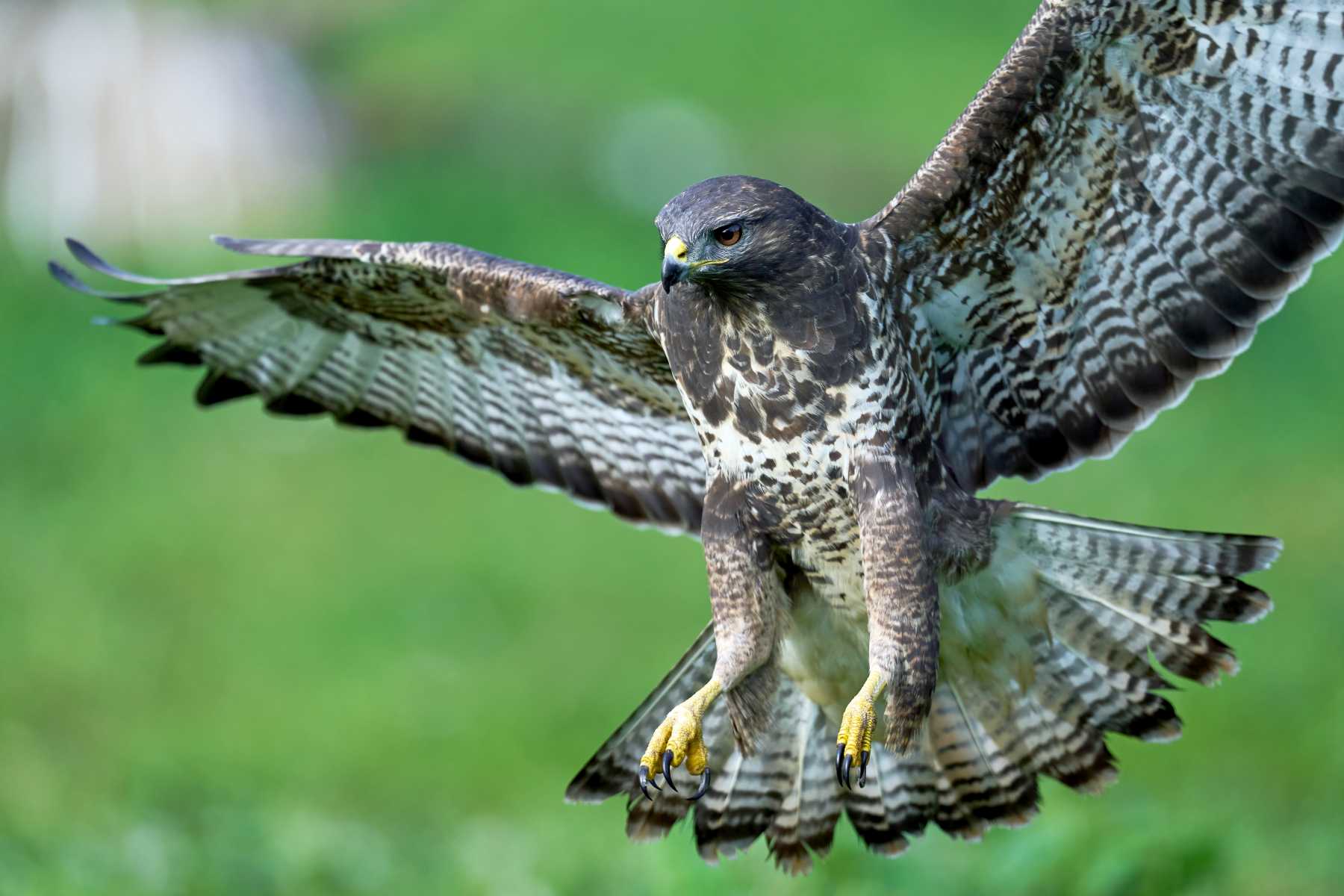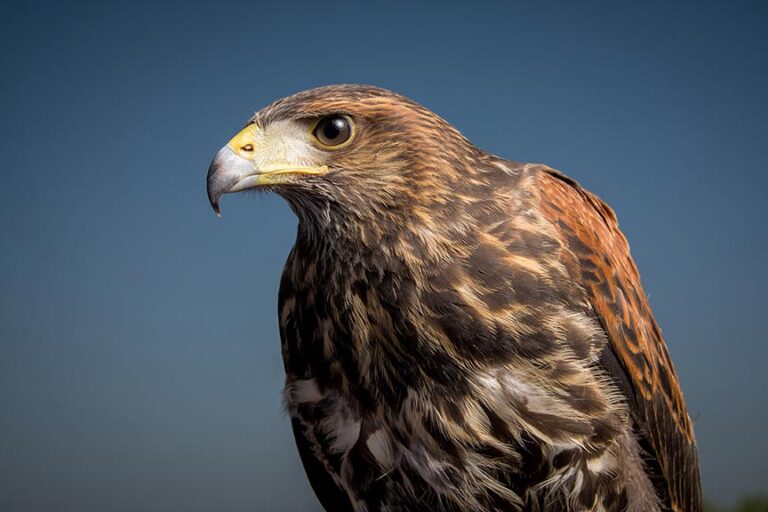Are Hawks Dangerous & Aggressive? (Attack or Eat Humans)
Are Hawks Dangerous & Aggressive?
Are Hawks Dangerous?
Hawks, with their majestic appearance and impressive hunting skills, often elicit a sense of awe and wonder when spotted soaring through the skies. But the question remains – are hawks dangerous? Well, let’s delve into this topic to uncover the truth about these magnificent birds of prey.
When considering whether hawks are dangerous creatures, it’s crucial to understand their natural behavior and instincts. Hawks are carnivorous birds that primarily feed on small mammals, birds, and sometimes reptiles.
While they may swoop down swiftly to catch their prey, they generally pose no direct threat to humans. In fact, hawks tend to avoid human interaction unless provoked or threatened.
Despite their sharp talons and beaks designed for hunting, instances of hawks attacking people are extremely rare. These birds prioritize targeting smaller animals that they can easily overpower for food.
However, during nesting season or when defending their territory, hawks may exhibit protective behavior if they perceive humans as a threat to their young. Some concerns have been raised about the potential transmission of diseases from wild animals like hawks to humans.
While it’s essential to exercise caution around any wildlife species for this reason, the risk of contracting diseases from hawks is minimal as long as proper hygiene practices are followed. Avoiding direct contact with wild animals and seeking medical attention if bitten or scratched by a hawk is advisable.
In terms of physical danger posed by hawks towards humans, it’s important to note that these birds are not known for targeting people as prey. Their diet does not include humans, so the likelihood of a hawk attempting to eat a human is virtually nonexistent.
However, in rare cases where a hawk feels threatened or cornered by a human, defensive behaviors such as swooping or vocal warnings may occur. ,
while hawks possess certain traits that could be perceived as intimidating, they do not pose significant risks or dangers
to humans under normal circumstances. By respecting these magnificent creatures’ space
and appreciating them from a safe distance, we can coexist peacefully with these remarkable predators in our midst.
Are Hawks Aggressive?

Hawks are known for their majestic appearance and impressive hunting skills, but one common question that often arises is whether these birds of prey are aggressive. When it comes to the behavior of hawks, aggression is a trait that can vary depending on the species and individual bird. In general, hawks are not inherently aggressive towards humans.
They typically avoid interactions with people and prefer to focus on hunting for their prey in their natural habitat. However, there are instances where hawks may exhibit aggressive behavior, especially during mating season or when defending their territory or nest.
Some hawk species are more territorial than others and may display aggressive behaviors such as vocalizing loudly, swooping down at perceived threats, or even engaging in physical confrontations. These displays of aggression are primarily aimed at other birds or animals encroaching on their territory rather than humans.
It is important to note that while hawks may appear aggressive in certain situations, they are unlikely to attack humans unprovoked. In most cases, they will choose to fly away rather than confront a human being.
However, if a hawk feels threatened or cornered, it may resort to defensive measures such as diving towards the perceived threat with its talons outstretched. Overall, while hawks can exhibit aggression under specific circumstances, they are not generally considered dangerous to humans.
It is crucial to respect these magnificent birds’ space and observe them from a safe distance to avoid any potential conflicts. Understanding the behavior of hawks can help foster coexistence between humans and wildlife in their shared environments.
Do Hawks Bite?
When it comes to the question of whether hawks bite, it’s essential to understand their behavior and natural instincts. Hawks are formidable predators in the avian world, equipped with sharp talons and powerful beaks designed for hunting. However, despite their impressive weaponry, hawks do not typically bite humans unless provoked or threatened.
In the wild, hawks primarily feed on small mammals, birds, and other prey suitable for their size. Their hunting techniques involve swooping down from great heights with precision and speed to catch their target using their talons.
While they may exhibit aggression towards perceived threats in their territory or during nesting season, hawks usually avoid human confrontation. It’s worth noting that encounters between humans and hawks are relatively rare, given that these majestic creatures tend to steer clear of populated areas.
In urban settings where human activity is prevalent, hawks may occasionally perch on buildings or trees in search of food but are unlikely to approach people unless they feel threatened. If a hawk were to bite a human, it would likely be out of self-defense or as a last resort when feeling cornered.
In such instances, the hawk’s bite is not intended as an act of predation but rather as a means of protection against what it perceives as a threat. Understanding this aspect of hawk behavior underscores the importance of respecting wildlife boundaries and observing these magnificent birds from a safe distance.
Overall, while hawks possess the physical capability to inflict bites with their sharp beaks if necessary, such interactions with humans are uncommon and can usually be avoided by exercising caution and mindfulness in areas where hawks are known to frequent. By appreciating these creatures from afar and maintaining a respectful distance, we can coexist harmoniously with these remarkable predators in the natural world.
Do Hawks Attack Humans?

Hawks are majestic creatures that evoke a sense of awe and wonder with their impressive hunting skills and sharp talons. While they may be fearsome predators in the animal kingdom, the question of whether hawks attack humans is a common concern among those who encounter these birds of prey in the wild.
It is essential to understand that hawks, by nature, are not inclined to attack humans. These birds typically avoid human interaction and will only resort to aggression if they feel threatened or provoked.
Hawks have keen eyesight and can identify potential threats from afar, allowing them to steer clear of humans in most cases. However, there have been rare instances where hawks have exhibited aggressive behavior towards humans.
This usually occurs when a hawk feels cornered or if its nesting area is disturbed. In such situations, the hawk may display defensive behaviors such as swooping down or vocalizing loudly to intimidate perceived threats.
Despite these occasional displays of aggression, it is crucial to note that actual physical attacks on humans by hawks are extremely rare. Hawks are more likely to target smaller prey such as rodents, insects, and other birds for sustenance rather than actively seeking out humans as food sources.
To minimize the risk of potential encounters with aggressive hawks, it is advisable to maintain a safe distance from these birds and avoid approaching their nesting sites during breeding season. By respecting their natural habitat and observing these magnificent creatures from afar, we can coexist harmoniously with hawks in the wild.
Do Hawks Eat Humans?
Hawks are incredible creatures that are often misunderstood. One common question people have is whether hawks eat humans.
Let’s dive into this fascinating topic to uncover the truth behind these majestic birds of prey. First and foremost, it is important to clarify that hawks do not typically eat humans.
Hawks are carnivorous birds that primarily feed on small mammals, insects, and other birds. While they may occasionally hunt larger prey like rabbits or squirrels, human beings are definitely not on their menu.
Hawks have keen eyesight and incredible hunting skills that allow them to target and capture their prey with precision. They rely on their sharp talons and beak to catch and consume their food efficiently.
So, rest assured, you won’t find hawks swooping down from the sky to snatch up unsuspecting humans for dinner. In the rare instances where hawks do come into contact with humans, it is usually due to territorial behavior or defense of their nests.
Hawks are protective of their homes and may exhibit aggression towards perceived threats in order to ensure the safety of their offspring. However, these defensive actions are not indicative of a desire to consume humans but rather a natural instinct for survival.
In general, human encounters with hawks are minimal, as these birds tend to avoid populated areas and prefer open spaces where they can hunt freely. If you ever come across a hawk in the wild, admire its beauty from a safe distance and appreciate its role in maintaining ecological balance.
Remember, while hawks may be powerful predators in the animal kingdom, they pose no significant danger to us humans. So next time you see a hawk soaring majestically through the skies or perched regally on a tree branch, admire its grace and prowess knowing that it is simply following its natural instincts as a hunter in the wild – not as a predator seeking out human prey.
Are Hawks Friendly?
Many people may wonder, are hawks friendly creatures? While hawks are not typically known for being affectionate or seeking out human interaction like a pet would, they also aren’t inherently aggressive towards humans. Hawks are wild animals that prioritize hunting and survival in their natural habitat.
However, there have been instances where hawks have shown a level of tolerance and curiosity towards humans without posing any threat. In certain cases, hawks have been observed perching near human-populated areas out of convenience rather than aggression.
They might use tall structures such as buildings or trees as vantage points to spot potential prey like small mammals or birds. This behavior can sometimes be mistaken for aggression when in reality, the hawk is simply focused on its hunting instincts rather than on any intention to harm humans.
Additionally, some hawk species have adapted to urban environments and may become accustomed to the presence of humans over time. For example, urban red-tailed hawks have been known to nest in cities and parks where they coexist with people without causing any harm.
These hawks may even become somewhat habituated to human activity but still maintain their wild instincts and behaviors. It’s important to note that while hawks may not be inherently friendly towards humans in the traditional sense, they are crucial components of the ecosystem and play a vital role in controlling pest populations.
By preying on rodents and smaller birds, hawks help maintain a balance in nature that benefits both wildlife and human communities. Understanding and respecting the natural behaviors of hawks can lead to peaceful coexistence with these magnificent birds of prey.
Overall, while interactions between humans and hawks may not always involve direct friendliness from the birds, it is possible for these majestic creatures to share our environment harmoniously. By observing proper precautions such as maintaining a safe distance from wild animals and avoiding feeding them directly, we can appreciate the beauty of hawks from afar without disrupting their natural behaviors or endangering ourselves.undefined
Hawk Dangerous & Aggressive Summary
While hawks are majestic birds of prey, they are not inherently dangerous or aggressive towards humans. Like all wild animals, hawks prioritize their survival and will only attack humans if they feel threatened or cornered. It is rare for hawks to target humans as prey, as their natural diet consists of small animals like rodents, insects, and sometimes other birds.
While it is possible for a hawk to attack a human if provoked or defending its nest, these instances are uncommon and can usually be avoided by giving the bird its space. Hawks have keen eyesight and impressive hunting skills that enable them to catch prey in flight or from perched positions.
They do not view humans as potential food sources but rather as large creatures to be wary of. Contrary to popular belief, hawks do not pose a significant danger to humans.
These birds play a crucial role in maintaining ecological balance by controlling populations of pests like mice and insects. Humans can coexist peacefully with hawks by respecting their territories and avoiding actions that may provoke defensive behaviors.
It is important to remember that wildlife should be observed from a safe distance to prevent any misunderstandings or conflicts. Hawks are vital members of the ecosystem and should be admired for their grace and hunting prowess from afar.
By understanding the habits and behaviors of these magnificent creatures, we can foster a harmonious relationship with nature and appreciate the beauty they bring to our world. While hawks may appear intimidating due to their sharp talons and predatory nature, they are not inherently dangerous towards humans.
By respecting their space and observing them with appreciation from afar, we can admire these magnificent birds without fear. The occasional hawk sighting should be seen as a wondrous encounter with wildlife rather than a cause for alarm or concern about potential attacks on humans.undefined


